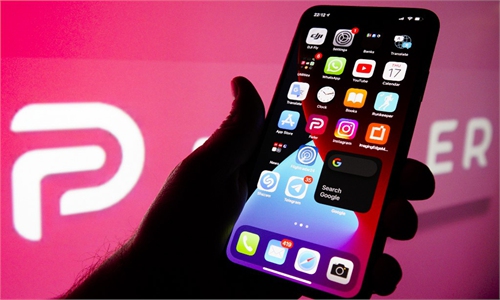OFilm shares hit by Apple ‘cut-off woes’, interdependence theory prevails despite decoupling fears
Warning to Chinese suppliers to reduce reliance on US tech giant

Stock market Photo: IC
Shares of Apple supplier OFilm Group Co took a hit on Wednesday after a stock exchange filing seemingly confirmed months of speculation that the iPhone maker would give the camera module maker the ax.
While the market remains split over the prospects of the Apple ecosystem, it's likely that the US technology giant's Chinese suppliers will have to work harder to wean themselves from reliance on Apple, in case there's any serious impact from the iPhone maker's strategic overhaul or changing market trends, industry watchers said.
At the same time, it's equally or even more difficult for Apple to reduce its dependence on Chinese suppliers, despite the US-China tech decoupling being pushed by the US government, they stressed.
Shares of OFilm plummeted by the 10-percent daily limit at the opening and the plunge continued into the market close, following a filing with the Shenzhen Stock Exchange that revealed a notification it received from a particular overseas client that plans to terminate its procurement ties with OFilm and the company' subsidiary units.
Without identifying the client, OFilm said that its operating income from the outgoing partner totaled 11.7 billion yuan ($1.8 billion) in 2019, accounting for 22.51 percent of the total for the year.
The overseas client is believed to be Apple, and the filing appears to have confirmed market rumors that began to circulate in September 2020 that OFilm would be removed from the roster of Apple suppliers.
Wednesday's plunge extended OFilm's losses to 51.65 percent since September 1, 2020.
In response to a request for comment from Bloomberg claiming Apple had cut ties with OFilm over the Chinese firm's alleged involvement in "forced labor" in Northwest China's Xinjiang Uygur Autonomous Region, resulting in the stock rout, Foreign Ministry spokesperson Zhao Lijian said on Wednesday that there's no such thing as forced labor in Xinjiang, and relevant lies are just the spread of rumors by Western countries.
Apple didn't immediately comment.
The stock market turbulence is indicative of Apple suppliers' woes in relation to the iPhone maker's strategic tweaks, Ma Jihua, a veteran industry analyst, told the Global Times on Wednesday.
Some Chinese contract manufacturers bet on one major client. But if they fail to upgrade their businesses, through an expansion of product lines or an improvement in technological capabilities, strategic changes by such clients would leave them at the mercy of others, Ma said.
Shenzhen-based Luxshare Precision Industry, a key supplier to Apple's wireless ear buds, has seen its shares in pullback mode since the start of the year, with the price down nearly 40 percent since mid-January.
Luxshare Precision's shares edged up 0.44 percent on Wednesday, but its stock lost 6.49 percent on Monday when Ming-Chi Kuo, a prominent Apple analyst at TF International Securities, cut his forecast for AirPods shipments by 30-35 percent for this year.
AirPods shipments are estimated to decline to about 78 million units for the whole of 2021, according to Kuo.
However, Sun Yanbiao, president of the Mobile No.1 Research Institute, said that Apple is poised to sit atop of the global smartphone sales rankings for the first quarter of the year, underpinned by the huge popularity of the iPhone 12 series. Sun maintained an upbeat forecast for the Apple ecosystem, with shipments of AirPods to hit 150 million units this year, an increase of roughly 50 percent from last year.
That means Apple's Chinese suppliers will still get an earnings boost, Sun told the Global Times on Wednesday.
Even in the case of OFilm, as Ma pointed out, being among Apple's suppliers shows the company's top-tier position globally as measured by manufacturing equipment, technical capacities and managerial skills, and there's still a chance of the camera module maker remaking itself beyond an original equipment manufacturer.
OFilm and Luxshare Precision are among Chinese technology companies that have become targets of a US clampdown on China's technology rise through such means as being added to the US Entity List and the launch of Section 337 investigations, fueling woes over the cut-off of Chinese suppliers by US tech giants, including Apple.
It unlikely that Apple, an integral part of the US technology community, would entirely disregard the US government's push for supply chain cut-offs. But a relocation of its Chinese supply chains in any other market - Vietnam, Malaysia and India, for example - won't be possible in the foreseeable future, Ma reckoned.
In the words of Sun, it will be difficult for Apple to reduce its reliance on Chinese suppliers, as factories outside China are still overwhelmingly run by Chinese companies whose core technologies, key teams and senior executives largely hail from China.
It's most likely the case that one Chinese supplier's loss will be another one's gain, he commented.
In a sign, Cowell E Holdings Inc, a Hong Kong-listed camera module maker that's also an Apple supplier, saw its shares rally 13.86 percent on Wednesday.


